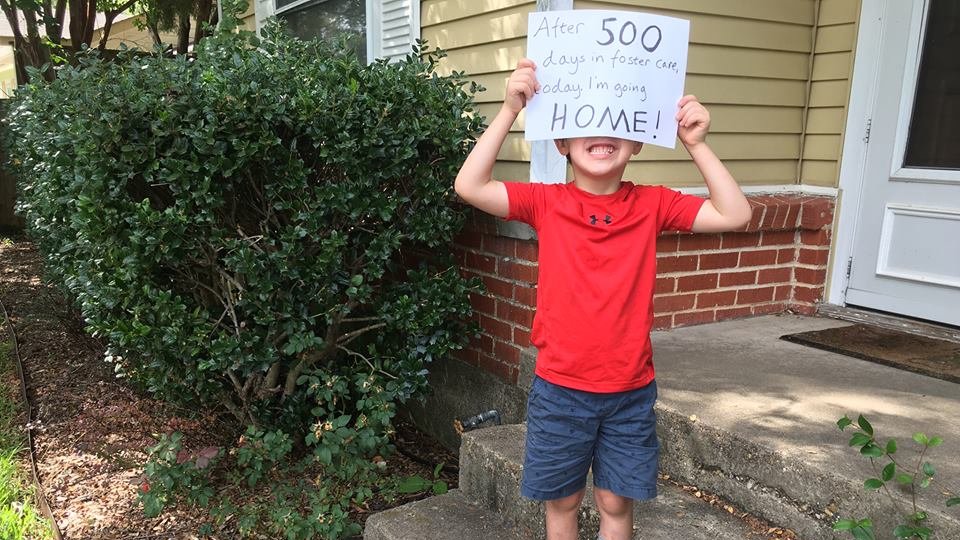Growing in generosity and compassion: The blessing of reunification
I first became acquainted with my new foster son’s mother through a box handed to me by a caseworker not long after he was placed in our home. I’d learned her name and a few other details from court documents, and we’d met at the first parent visit – an uncomfortable moment on the curb outside the Texas Department of Family and Protective Services' office – ending with the visit supervisor pulling the sobbing child away from his mom and carrying him to my car. While unpacking this box though, I learned much more about my foster son’s mom.
Inside were shoes, clean and neatly folded clothing, toiletries, medications, gummy vitamins and a few toys. “This is the work of a parent who’s going to try as hard as she can to get her child back,” I thought. I sorted the things she’d sent into drawers alongside the new things I’d purchased, contemplating our shared role as parents of this fragile, hurting, hyperactive little boy.
Like many couples, my husband and I originally came to foster care through infertility. We wanted to use our childlessness to serve children in need, but we also hoped to bring children to our family through adoption. Our situation soon changed (we are “that couple” you always hear about who learns they’re pregnant while in foster care training), but meanwhile our motivations had changed also. Through training classes with Buckner, our vision for foster care was refined and expanded to include birth families, a calling to support and serve them as well as the children placed in our care.
We soon learned our foster son’s mother would be a constant presence in his mind and in our family life. “You need to meet my mom; she’s a really nice lady,” he told me on his second day in our home. A few days later I pointed out a butterfly in our backyard. “That butterfly got lost from his mom and now he’s looking for her everywhere,” he said.
His mom was the center of his world, and though he lived with us over a year, the pain of his separation from her endured, influencing our conversations, bedtime routines, picture book selections, art projects and parenting choices. To parent him well and help him heal from his trauma meant including her in his life any way we could.
So, though it was sometimes uncomfortable and we seldom felt like we were doing it well, we slowly cultivated our relationship with his mom. At each visit, we sent her artwork, a few photographs or a short letter. We followed a caseworker’s suggestion to share my phone number so she and her son could talk. We began texting – I’d send her pictures, or she’d ask for updates about school or therapy. I tried to arrive early for parent visits so we could all spend some time together while waiting for the visit supervisor. For her birthday, he and I made her a present together. For his birthday, we hosted a party in a public space and invited his mom and her friends. That evening was filled with the special mixture of awkwardness and blessedness experienced when we choose to welcome rather than shelter ourselves from people we’re called to serve.
As the case progressed toward reunification, our caseworkers encouraged us to share with her our routines and parenting methods, things we’d learned about her son’s nutritional needs and behavioral triggers and ways to help him cope with his trauma. Through the rocky transition into overnight visits, we talked on the phone about discipline issues and therapy homework, and she even allowed me to put him down for a nap at her house so she could observe our routine.
Our efforts to support reunification weren’t exceptional – I’ve heard of foster parents doing far more – and we were more than willing to make them, yet it stretched and challenged us to keep opening our hearts even when things were complicated or uncomfortable. In retrospect, I only wish I’d been more of a friend to my foster son’s mom. I was humbled by her graciousness toward us and acceptance of our role in her son’s life, despite the pain of her situation.
Our little boy is home with his mom now. My first impression proved correct – she did try her best, despite struggles and setbacks. After many long, difficult months, the judge ordered reunification. I don’t want to sugarcoat things: foster care is complicated, and even the “happy endings” are often clouded by unresolved concerns and less-than-ideal circumstances. But we’re thankful our foster son got to go home, and that we got to be part of his family’s story.
We still hope to adopt, yet we’re increasingly convicted our first calling in foster care is to love our neighbors as ourselves. We feel our responsibility as foster parents was every bit as much to our foster son’s mother as it was to him: our mission to serve and bless her by serving and blessing her child. We can’t know if our efforts made a difference for their family. I hope so. But I do know through that experience we are forever changed, drawn nearer to the heart of Christ, strengthened in faith and challenged to grow in generosity and compassion.
Written by Caitlin Beauchamp. She and her husband, Dan, are foster parents through Buckner International in Dallas.
May is National Foster Care Month. To learn more about how you can become a foster parent or support foster families in your community, visit buckner.org/nationalfostercaremonth.




Add a Comment